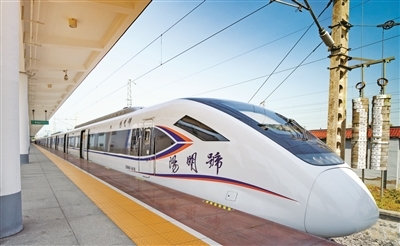Hangzhou— Ningbo intercity train starts trial operation
- Details
- Category: Ningbo District
- Published: Monday, 14 August 2023 14:38

At 7:27 am on August 1st, the first intercity train from Ningbo to Hangzhou South opened for trial operation. This means that Hangzhou and Ningbo have officially entered a new "urban rail" era.
This year marks the fifth anniversary of the integrated development of the Yangtze River Delta becoming a national strategy. The strong promotion of transportation integration has brought Ningbo increasingly closer to cities in the Yangtze River Delta.
In 2017, the Ningbo—Yuyao intercity train was first opened. Two years later, this intercity rail extends to Shaoxing, and Ningbo and Shaoxing are closely connected. Today, this intercity rail accelerates the "two-way travel" between Hangzhou and Ningbo.
Transportation is the vanguard of the integration of the Yangtze River Delta. This intercity rail, which is constantly extending, is bound to improve transportation network between Hangzhou and Ningbo and accelerate the integration of transportation in the Yangtze River Delta. This is the necessary foundation for the high-quality integrated development of the two regions and enhancing their comprehensive level.
In the future, the "Ningbo Mode" will also go from "1" to "100", optimize the train frequency, strive to connect the intercity trains to Hangzhou East railway station or Hangzhou railway station, and accelerate the construction of Moushan Station, Zhangting Station, Sanqishi Station and Cicheng Station, connecting Hangzhou, Shaoxing, the center of Ningbo and the important economic and cultural tourism cities along the Xiaoshan–Ningbo railway, thus creating a real Hangzhou--Shaoxing --Ningbo bus line and becoming a bus routes for commuting, travel, schooling, medical treatment, and shopping.
Transportation is a key factor for accelerating the integration of the two cities into the Yangtze River Delta. A city with strong transportation can not only strengthen personnel exchanges between cities, but also promote the development of the city's economy, culture, and logistics
